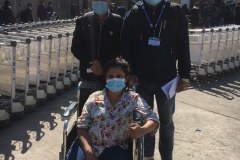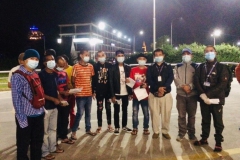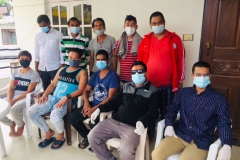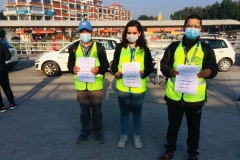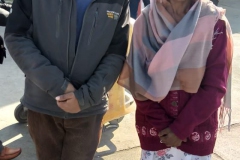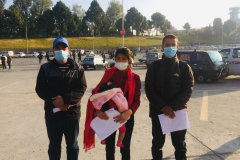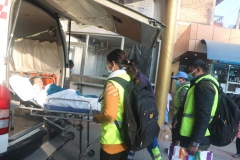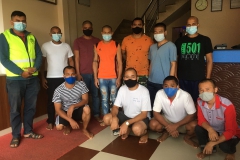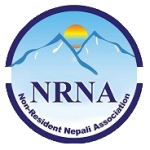NRNA Covid-19 Response

NRNA COVID-19 Response to Migrant Workers-Relief and Repatriation
BACKGROUND
Foreign employment has become the most sought-for employment option for hundreds of thousands of Nepali youths. The Government of Nepal has opened 110 countries for institutional labor permits for foreign employment. Over 4 million labor permits have been issued by the Department of Foreign Employment in between 2008/09 and 2018/19. During COVID-19, 3, 68,344 and 166,698 Nepali youths received labor permits in 2019/20 and 2020/21 respectively. The preliminary result of the 2021 census has indicated that 2,169,478 Nepalis are living in foreign countries, with 81.28 per cent males and 18. 72 per cent females. The major countries of destination for Nepali migrant workers included Qatar (31.8%), United Arab Emirates (26.5%), Saudi Arabia (19.5%), and Kuwait (6.8%).Nepali labor migrants have sent home a total of NPR 7,114.97 billion as a remittance between 2008/09 and 2020/21. The country received NPR 879 billion in FY 2018/19, NPR 875 billion in 2019/20 and NPR 961 billion in 2020/21 as remittances.The contribution of remittance in the national economy is around one-fourth of the GDP as the remittance ratio in 2020 was 24 per cent of the country’s GDP. Remittance receiving households account for 55.8 per cent of the total households in Nepal.
Despite a source of income for millions of Nepali youths, foreign employment has innumerable issues. Many Nepali migrant workers are pushed to vulnerable situation, and COVID-19 has deepened the severity of the vulnerability, for it has affected all aspects of human life, including the world of work and health. There are 995,888 active COVID-19 positive cases with 11,632 deaths in Nepal due to the global pandemic until 20 January, 2020. According to the COVID-19 Crisis Management Center, a total of 572,571 people were rescued to Nepal until 16 September 2021. The pandemic-led mobility restrictions is already affecting almost 2.2 billion workers, representing approximately 68 per cent of the world’s workforce. Migrant workers are particularly at risk due to the impact of COVID-19, limiting their access to work in the destination countries as well as return to Nepal.
The migrant workers who fall into the special vulnerable group have been seriously impacted by the current crisis. At a time when undocumented and domestic workers, pregnant, sick and with underlying health conditions are more vulnerable, the governments in the countries of destination have not been providing proper health service and treatment facility to the workers working in their countries, and not provided effective protection of employment and remuneration. With the spread of COVID-19, many migrant workers experienced job losses, layoffs and unpaid leaves, reduction in work hours.National Association of Foreign Employment Agencies estimated that the pandemic caused major job losses for Nepali workers in major countries such as in the United Arab of Emirates (30%), Malaysia (30%), Qatar (20%), Saudi Arabia (20%), Kuwait (15%), Bahrain (12%) and Oman (10%). This had an adverse impact on workers who were left stranded without access to basic amenities. Many employers failed to provide workers with accommodation and food. The pandemic created serious problems for undocumented migrant workers, domestic workers, workers whose contractual period finished, and those who were already in an exploitative situation during the migration process. For example, undocumented workers in Malaysia were targeted, raided and arrested during the pandemic.
Based on the consultation with Nepali migrant workers and Ministry of Foreign Affairs (MOFA) and Nepali embassies in the destination countries, it was necessary to provide support to the Nepali migrant workers on relief, response and repatriation. To promote and uphold the rights of Nepali migrant workers and to enable the Government of Nepal to fulfill its obligations of protecting the rights and welfare of its citizens, ILO intended to engage with the Non-Resident Nepali Association (NRNA) for implementing the COVID-19 Response to Nepali Migrant Workers’ Relief and Repatriation Program. The UAE, Kingdom of Saudi Arabia, Qatar and Malaysia were the project destination countries. Later, Kuwait, Bahrain and Oman were added to the list. The major support sectors under this project were: immediate shelter and food distribution, medical and legal counselling and re-employment support, documentation support for the needy migrant workers to link with diplomatic missions and other concerned authorities at destinations,
support for small detention fines, organizing outreach camps and supporting workers for passport renewal and counselling as per the need, tele-medicine/small medical assistance, air tickets and PCR test support. Moreover, the program also supported some medical logistic items to the provincial/local level quarantines and hospitals such as mosquito nets, phenyls, hand washing liquid, PPE sets, Dettol, plastic boots, gloves, sanitizers, masks and oximeters.
Payment for hotel quarantines, PCR tests and local transportation were the support provided to the needy migrant workers to reach home safely after arrival to Kathmandu from concerned destination countries. The project reached out to 28,127 vulnerable Nepali migrant workers and supported 27,526 workers with food and shelter, counselling, outreach camps, PCR tests, air tickets, documentation, hotel quarantines, local transportation and others. The project was implemented in coordination and collaboration with Nepali diplomatic missions to ensure sustainability. The project coordinated its activities with relevant government stakeholders such as MoFA, MOLESS, FEB and like-minded NGOs that are working on migration.
This project completion report highlights the activities performed under the ILO-funded COVID-19 Response to Nepali Migrant Workers’ Relief and Repatriation Program implemented by the NRNA, documenting the gaps and challenges encountered during the projection implementation and lessons learnt and recommendations for future programs.
OBJECTIVES
4.1 General Objective
The general objective of the ‘COVID-19 Response to Nepali Migrant Workers− Relief and Repatriation of Nepali Migrant Workers Program’ was to provide immediate relief and repatriation support to stranded and vulnerable Nepali migrant workers in the Middle-East countries and Malaysia in collaboration with the Nepali diplomatic missions and other relevant stakeholders both in the countries of destination and the country of origin.
4.2 Specific Objectives
-
- To support Nepali missions in the Middle East countries and Malaysia to strengthen their capacity to provide effective consular services to Nepali migrant workers impacted by COVID-19;
- To provide legal/paralegal assistance and short term shelter support for Nepali migrant workers made most vulnerable by COVID-19; and
- To support the Government of Nepal in providing safe and secure transit services to Nepali migrant workers to return home in Nepal.
PROJECT MANAGEMENT
5.1 Management Team and Execution
Project Director: Dr. Badri K.C., Vice-President, NRNA
Steering Committee:
-
- Dr. Badri K.C., NRNA Vice-President (Russia)
- Dr. Hem Raj Sharma, NRNA General Secretary (United Kingdom)
- Dr. Puru Shrestha, NRNA High Level Committee on COVID-19 Mitigation Member (USA)
- Ekanath Khatiwada, NRNA Foundation Committee Chair (Nepal)
- Hari Bhattarai, NRNA President, Malaysia, 2019/21
- Tej Bahadur Thapa, NRNA NCC President, Saudi Arabia, 2019/21
- Mohamed Muktada Musalman, NRNA NCC President, Qatar, 2019/21 and 2021/23
- Niranjan Silwal, NRNA NCC Acting President, the UAE 2019/21
- Binod Bahadur Thapa, NRNA NCC President , Malaysia 21/23
- Dammar Yadav , NRNA NCC President , Saudi Arabia 21/23
- Rajendra Kumar Raut, Former Project Manager (Based in Kathmandu)
- Sujata Sharma , Project Manager (Based in Kathmandu )
NRNA developed detailed project implementation and financial guidelines. There was a third-party auditing of the project and its budget. Project implementation guidelines, roles and responsibilities of the project director, project manager, field officers (volunteers), legal officers in the destination countries and holding center assistants and project accountant in Nepal were prepared separately.
-
-
- The project director was responsible for overall project management, communication with stakeholders and collaboration with international organization.
- The project manager reported directly to the project director. The manager developed a weekly program in consultation with the project director and the steering committee.
- The project manager managed programs and field officers in all four countries. There was one team leader among the field officers. Monitoring, documentation and reporting mechanism including strong financial documentation and reporting
- The steering committee formulated the strategic plan and guideline of the projects, and oversee the overall management, including management of human and financial resources of the project.
- There was a separate project accountant who would verify and monitor financial expenditures and ensure needful compliances in close coordination with concerned team members. The accountant would directly report to the project manager.
- A short online training for all hired persons was organized after recruiting field officers.
-
Project Reporting: An Internal reporting weekly, monthly reporting to ILO and other stakeholders.
5.2 Project Deliverables
-
-
- Complete implementation of Intervention plan in destination Countries and in Nepal qualitatively and quantitatively as indicated in the project.
- Prepare detail report for the support occurred to migrants in each country.
- Prepare detail report for the transit support occurred in Nepal.
-
- MAJOR ACHIEVEMENTS
The project was meant for responding to the vulnerable situation of Nepali migrant workers impacted to COVID-19, in collaboration with the diplomatic missions in the countries of destination (CoDs) and the government and other stakeholders in Nepal, for their immediate relief and repatriation. The project carried out different activities and made significant achievements. The project completion report has indicated some key areas of support where the demands were high. The unmet needs can be addressed if the project continues.
Some Glimpse of Our Works
News
1.ओमानबाट प्यारालाइसिस महिलालाई ‘एयर स्टेचर’ मार्फत स्वदेश ल्याइयो
2.कतारबाट उद्धार गरिएका युवा भन्छन– ‘पैसा कमाउन गइयो, कुटाइ खाएर रित्तो हात आइयो’
3.मलेसियाको जेलमा फसेका १४ नेपालीलाई एनआरएनएले स्वदेश ल्यायो
Downloads
August Report NRNA-ILO Joint Project



